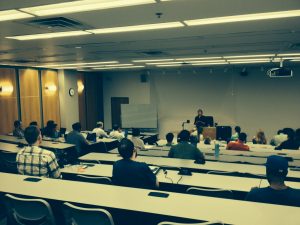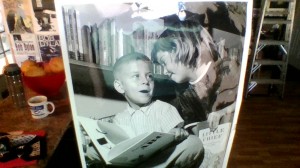Wonderful advice that economist Steven Levitt received from his dad:
I remember this one time–I must have been like seven or eight years old–my dad took me to Gibby’s Diner. This was in the closest village called Quaker Street. And Quaker Street is just like one stoplight, a general store and the diner. And all my brothers and sisters had at one point worked at Gibby’s Diner either cooking or as a waitress or whatnot. And for my dad to bring me there alone, the two of us to sit at the counter, to this kind of sacred place. It was surreal to be there. And I remember we sat at the counter, and I don’t remember what I got to eat, but I remember my dad got a cup of coffee with a scoop of vanilla ice cream in it, which looking back I realized–he could have been a Starbucks imaginer. And I was having whatever I was having, and he introduced me to this game he called Powers of Observation.
And the way Powers of Observation worked was he would say, “All right, Stevie. I just want you to look around and take it in. Just really look around, pay attention, see what you’re looking at, take it in, and get attuned–and listen hard to, OK?” Like I said, I was probably just eight or seven years old, and he said “I’m going to give you five minutes to just take it all in.”
So I sat there and I looked around; and I take it all in. And I don’t really know where he’s going with this. And then after a few minutes, he told me to close my eyes.
He’d say, “OK the waitress, Ann”–you know, we knew her, “Ann–what color is her apron?”
And I said, “White?” And he said, “Ahh, you’re just guessing.” And I said, “White!” And he said, “That’s right, that’s right. OK. The lady behind us, what did she just order?”
“Grilled cheese?”
“Nope. Chili. OK, how many people have come in since we started playing Powers of Observation?”
And on it went, just like that. And he’d grill me on these facts large and small, any kind of site, smell, sound–anything like that. And the first couple rounds we did this, I was terrible. I couldn’t get anything right at all. I just didn’t have any powers of observation. And then as we kept doing it, I got better. And then about after 20 minutes, I felt that I could take these little snapshots with my mind. And then repeat what I’d seen. My father, that one day, at Gibby’s Diner in Quaker Street, New York, he taught me that memory–or at least observation–is a muscle that you can build. And I’ve been flexing that muscle every day since then. Or at least trying to. So we were a family with practically no money, and without really that much time with each parent, but I will never forget that one day, that incredibly great thing, an incredibly valuable thing, that my father gave me.
The rest is here:
Things Our Fathers Gave Us: Full Transcript





